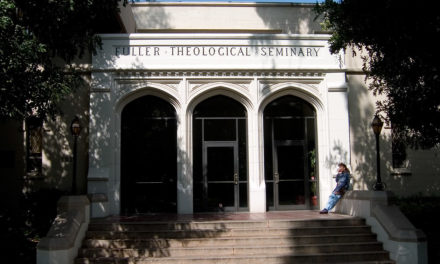You can learn a lot from the lives of others, and I’ve often enjoyed reading about the lives of U.S. presidents. Ronald Reagan —whose love affair with Nancy was well chronicled —once said that his wife gave him “a marriage that was like an adolescent’s dream of what marriage should be.” That’s quite a compliment!
Even as president, Mr. Reagan used to stand by the window in the White House and watch for the lights of the car that would be bringing his beloved Nancy home. And when the couple were inevitably separated by official duties, they kept in touch by writing notes and letters. One letter — reportedly written by the president aboard Air Force One —gives a touching picture of Reagan’s heart: “When you aren’t there, I’m no place, just lost in time and space. I more than love you, I’m not whole without you.”
I can relate. When I travel for work, I’ve become pretty accustomed to the rhythm of life on the road, and some days I feel too busy to be lonely. But it’s different when I’m home and Jean’s traveling. I miss her terribly, and I find myself literally counting the hours until her return. Until life feels … well, whole again.
In those (fortunately rare) moments, I appreciate Jean’s companionship all the more, and my convictions about the sacred gift of marriage are renewed. This God-ordained union —this two becoming one —is a profound wonder and a holy mystery. If perhaps you’ve lost that sense of wonder, it’s not too late to recover what the years may have obscured. And that all starts with understanding why God made marriage to begin with.
Not good to be alone
Can we even conceive of a world without marriage? If that’s difficult to imagine, it’s because God made us this way: He has wired into our hearts a desire to be with and for each other.
Indeed, marriage was the final piece to the Creation puzzle. It starts with an observation from God that most men can understand: “It is not good that the man should be alone; I will make him a helper fit for him” (Genesis 2:18).
God didn’t make a mistake by creating a man who was alone. He just announced that the design wasn’t complete yet. Things weren’t right until Eve arrived. And Adam knew this. “At last,” he says when he first sees Eve. “This at last is bone of my bones and flesh of my flesh,” Adam rejoices, recognizing that God created Eve from one of Adam’s own ribs. And so Adam is part of Eve, and Eve is part of Adam.
As Scripture proclaims, when a man and woman are united in marriage, “they shall become one flesh” (Genesis2:24). This is one of many reasons why we’re to take marital vows seriously. We are to see marriage not merely as a legal contract but as a covenant. It’s not an agreement with loopholes or termination clauses. When a man and woman pledge themselves to each other, they’re entering into the most intimate and lasting of all relationships.
In a world that has grown cynical of marriage, Christians have a story to tell —a story of man’s longing to give himself to another and to receive the other’s gift of self. And a story of God’s gift that satisfies that longing in a way no other human relationship can.
An obligation, an opportunity
Of course, there’s more to that story. Dr. Albert Mohler reflects on the profound nature of the marriage relationship: “Marriage is not primarily about our self-esteem and personal fulfillment, nor is it just one lifestyle option among others. The Bible is clear in presenting a picture of marriage that is rooted in the glory of God made evident in creation itself. The man and the woman are made for each other, and the institution of marriage is given to humanity as both opportunity and obligation.”
I think most of us would acknowledge that marriage is an obligation, but how many of us also see it as an opportunity? An opportunity for what? Guilt-free sex? Companionship? To conceive and raise children together? To provide for and to be provided for? Perhaps all of the above, but Dr. Mohler is referring to something beyond practical needs or pleasure. God’s plan for marriage gives an opportunity for true intimacy.
But within that opportunity lies a challenge. If we’re honest, most of us have to admit that we think about what we get out of marriage more often than we think about what we give. We’re inherently selfish people who keep score with our spouses. God’s plan for marriage gives an opportunity for true intimacy, but true intimacy doesn’t come from taking from your partner; it comes from giving.
I continue to learn this lesson in my own marriage. Early on, my wife, Jean, wrestled with depression and a lack of confidence that she could be a good wife and mother. My response to many of my wife’s ongoing insecurities? Give her pep talks. The way out of trouble, it seemed to me back then, was always to face a problem head on, armed with determination and positive thinking. One night, after an especially difficult conversation and another of my spirited pleas for mental toughness, Jean said to me through tears, “You know, Jim, not everyone can pull himself up by his bootstraps.”
I’ve matured, but I’m not perfect. Even today, it’s often tempting for me (and many husbands) to see difficult moments as problems in need of a quick solution. But I’m learning one of the best ways I can serve my wife — to be a giver, not a taker —is to listen to her thoughts and fears without passing judgment or serving up quick solutions. Yes, I can offer perspective and input when appropriate, but often what she craves is my ear. She deeply desires to be understood, not answered.
A mystery and a secret
In his book The Meaning of Marriage, Timothy Keller writes, “At night, as your head is about to hit the pillow after a long, hard day of marriage, I think many would identify with what Paul writes in Ephesians 5:32, that marriage is a profound mystery. It’s like a riddle, a puzzle, a maze. It’s not a Hallmark card.”
But wait, don’t we like Hallmark cards? Shouldn’t we strive for the perfect, happily-ever-after union? On the contrary, as Keller goes on to demonstrate, marriage is a mystery best viewed through the lens of the Gospel. If you want to understand marriage — and if you want to have a thriving marriage v you first have to understand what Jesus did for you on the Cross at Calvary. At great cost to himself, Jesus accomplished for you what you could never accomplish for yourself. God became man, suffered and paid your debt so that you might receive the reward of eternal life and unbroken fellowship with Him. Not exactly your typical Hallmark imagery.
The Christian understanding of marriage — built on self-sacrifice —is a reflection of Christ’s own sacrifice, in which He died that we might rise to eternal life. Christian marriage, then, is a story of submission and sacrifice for each other (Ephesians 5:22-23).
Reflecting on the mystery of marriage and its true purpose, theologian George W. Knight III wrote:
Marriage was designed by God from the beginning to be a picture or parable of the relationship between Christ and the church. … He planned it for this great purpose: It would give a beautiful earthly picture of the relationship that would someday come about between Christ and His church. This was not known to people for many generations, and that is why Paul can call it a “mystery.” But now in the New Testament age, Paul reveals this mystery, and it is amazing.
This means that when Paul wanted to tell the Ephesians about marriage, he did not just hunt around for a helpful analogy and suddenly think that “Christ and the church” might be a good teaching illustration. No, it was much more fundamental than that: Paul saw that when God designed the original marriage, He already had Christ and the church in mind. This is one of God’s great purposes in marriage: to picture the relationship between Christ and His redeemed people forever!
So, yes, marriage is a mystery, but one we begin to glimpse the meaning of in the Gospel. As pastor and theologian John Piper has written, marriage “contains and conceals a meaning far greater than what we see on the outside.”
I think I know what he means. Each evening as I drive down the road toward my home, I pass house after house, the lights of each one shining invitingly. But only one house captures my attention —my own. No one else cares much about that house. But I do. Because I know what’s inside, and what’s inside means all the world to me.
This article has been adapted from Marriage Done Right: One man, one woman. Copyright © 2016 by Jim Daly. Used with permission of Regnery Publishing.
For more marriage resources, go to https://www.focusonthefamily.com/marriage/






